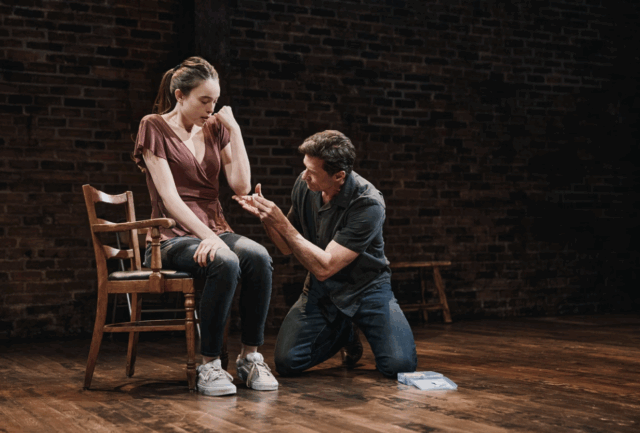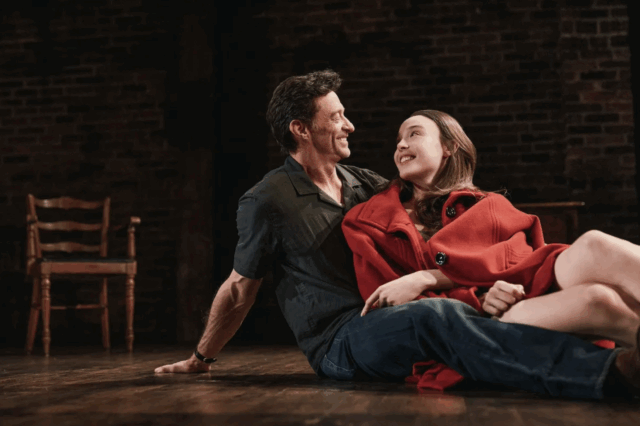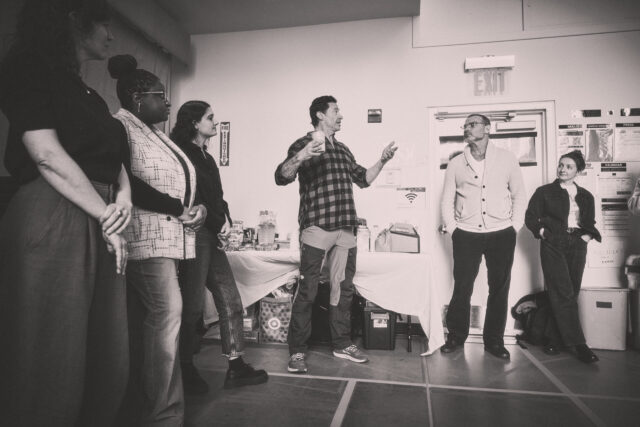
Author and professor Jon (Hugh Jackman) tends to student and fan Annie (Ella Beatty) in Sexual Misconduct of the Middle Classes (photo by Emilio Madrid)
SEXUAL MISCONDUCT OF THE MIDDLE CLASSES
Audible’s Minetta Lane Theatre
18 Minetta Lane between Sixth Ave. and MacDougal St.
Through June 18, $35-$298.50
www.audible.com
Sexual Misconduct of the Middle Classes might not quite be the story of the Big Bad Wolverine and Little Red Riding Hood, but it is an intriguing and thought-provoking adult fairy tale with a marvelous final twist and purposely ambiguous moral.
Hugh Jackman makes a curious choice for his off-Broadway debut and the inaugural show from his new company, Together, a collaboration with Audible, but it is an alluring and tantalizing success.
Cofounded by the Emmy–, Grammy–, and Tony–winning and Oscar-nominated Jackman with megaproducer Sonia Friedman, Together is “dedicated to live theater that is intimate and accessible . . . driven by a commitment to offering audiences a chance to experience theater in a fresh and engaging way” — including making half of the tickets available for free or $35. That’s precisely what happens with the New York premiere of Canadian playwright Hannah Moscovitch’s 2020 Sexual Misconduct of the Middle Classes, a pre-#metoo story about a relationship between a hunky college professor and a nineteen-year-old student that offers new insights on a familiar subject.
As audience members are still taking their seats, a young woman (Ella Beatty) moves around furniture on Brett J Banakis and Christine Jones’s long, narrow, and relatively sparse set, consisting of a few chairs and tables, a desk, and a floor lamp that morph from an office to a porch to a hotel room. She’s not part of the crew, and why she is arranging the set will become clear later. Jon Macklem (Jackman), a professor and famous novelist, enters and starts speaking in the third person, addressing the audience directly while Annie sits off to the side, watching closely but dispassionately. We soon find out that she is Annie, a shy, somewhat awkward teenager who did not enjoy high school and is hoping college will bring her more confidence and freedom.
As he narrates, Jon surveys the audience, making eye contact with as many people as he can, in the orchestra and the balcony. A real charmer, he reacts in a friendly manner when he hears a particularly loud laugh, gasp, or titter. At one point he sits over the lip of the stage, his feet dangling mere inches from people in the first row. Isabella Byrd keeps the lights only slightly dimmed during his monologues, then lowers them to a more accustomed level when Jon interacts with Annie.

Jon (Hugh Jackman) and Annie (Ella Beatty) begin a complex relationship in Hannah Moscovitch play (photo by Emilio Madrid)
“Well, he was agitated: he didn’t know why, nothing came to him” are his first words. He wonders, “Could it be a fragment of . . . ? His publishers were waiting on a novel about turn-of-the-century lumberjacks, so hopefully this girl was a part of that, or . . . could be shoehorned into it? Because also: come on, a girl, a young girl? Wasn’t there something deadly about the ‘young girl’ as an object of fiction? Wasn’t it where writers went to expose their mediocrity? Because wasn’t it so often the ‘young girl’ who was grossly underwritten, a cipher, a sex object, reduced to a cliché by lust-addled men?”
He knows precisely why he’s agitated, and it has everything to do with the young girl as opposed to the third divorce he’s going through. He adds, sounding like the literature professor he is, “He was on the side of the Greeks: learning is a seduction. . . . The erotics of pedagogy . . . That was the sort of thing you couldn’t say out loud without getting fired.”
Annie sits in the front row of his class and lives right across the street from Jon. He is surprised when he sees her standing at his house while he mows the lawn, but another day he writes outside on his porch, hoping she stops by. With a hesitating naivete, she tells him she loves his work, that it means a lot to her that someone else in the world thinks like she does.
When she suffers an injury, he asks her inside so he can patch her up, making “an ashamed, apologetic face” at the audience. He knows where this might lead, understanding that it is wrong and feeling panic. “Well, this, he recognized, was very bad,” he admits to us, trying to find a way to “get her the fuck out of his house.” But instead, he is soon locked in her embrace.
Jackman (A Steady Rain, The Music Man) is terrific as Jon; the actor is so handsome, so charming — so physically close — and Jon is so aware of what he is doing that we don’t want to see him as a villain, instead giving him the benefit of the doubt whenever we possibly can, despite, as he is well aware, “the horrible predictability of it all.” (In addition, Jackman is performing his Live from New York with Love concert twice a month through October.)
In her third play, following the recent Appropriate and Ghosts, Beatty, whose parents are Warren Beatty and Annette Bening, brings to Annie a nearly impenetrable quality, never giving away just how innocent she may or may not be, whether she is predator or prey, victim or ingénue, or whether a nineteen-year-old student can ever take responsibility for an affair with her college professor. When Jon is addressing the audience in third person, Annie sits in one of the chairs at stage left, with her ever-present red coat — the only burst of color in Ásta Bennie Hostetter’s otherwise subdued, naturalistic costumes — watching Jon, her eyes riveted but not in the same way ours are.

Hugh Jackman, Liev Schreiber, and others rehearse for two Together plays running in repertory at Audible theater (photo by Guy Aroch)
Three-time Olivier winner Ian Rickson (Jerusalem, The Weir), who previously directed Jackman in Jez Butterworth’s The River, guides the proceedings with a sure hand, maintaining an air of mystery as the relationship grows more complicated, perhaps more like that between J. D. Salinger and Joyce Maynard than the one in David Mamet’s two-character Oleanna. Moscovitch, whose 2016 Bunny also involves a sexual liaison between a male professor and one of his female students, avoids falling into any traps; her dialogue is concise and believable, and Jon and Annie are no mere cardboard cutouts but complex characters who are not sure what they want — or what they don’t.
Sexual Misconduct of the Middle Classes, which is running in repertory through June 18 with Jen Silverman’s new adaptation of August Strindberg’s Creditors, with Liev Schreiber, Maggie Siff, and Justice Smith, is not a he said/she said cliché-ridden narrative but a tense, realistic parable with plenty of bite and a finale that will have the drama spinning back through your mind for a long time to come.
[Mark Rifkin is a Brooklyn-born, Manhattan-based writer and editor; you can follow him on Substack here.]